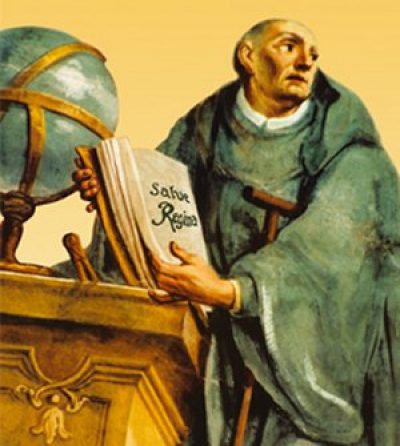“Though he is dead, he still speaks” (Hebrews 11.4) (Ros' Blog)

Every now and then I like to research disabled people from the past. I find it fascinating to see how, in an age when there was little understanding of disabled people’s strengths and abilities, and little teaching within the church of a Biblical theology of disability, some people still managed to triumph in circumstances that might defeat some of us modern Christians, and to shine a ray of hope down the centuries to us.
One such person was Hermann of Reichenau. Hermann was born into a noble family in 1013. He was born with severe disabilities which it is hard to diagnose all these centuries later, but which almost certainly included cerebral palsy and a cleft palate. He could not walk and a special chair was made for him to be carried around in.
Despite his physical limitations, Hermann was highly gifted intellectually. At the age of 7 he was sent for schooling and care to the monastery at Reichenau and studied under Abbot Berno. This in itself was quite remarkable, as it is really only in the modern era that education has begun to be made fully available to disabled people. He took full advantage of the opportunity and excelled academically, growing up to write scholarly works on mathematics, astronomy, history and music. Hermann was familiar with much Islamic scholarship in the field of science, and made it available to the Latin-speaking world.
Despite his severe physical limitations – he was never able to walk, and spoke only with great difficulty – Herman’s rich spiritual life was evident to all. He became a monk and eventually succeeded Berno as Abbott of the monastery at Reichenau. He became famous for his patience and joy even when he was in great pain, and people travelled from far to learn from his example. He wrote several hymns, some of which are still sung or said as prayers by Roman Catholic Christians today, including a number in praise of the Holy Spirit.
 Another of my heroes from the past, and one who has affected my life not only by his example, but by the writings and spiritual exercises he left, is Ignatius of Loyola. He was the youngest of 13 children, born in 1491 into a noble Spanish family, and lost his mother in early infancy. Unlike Hermann of Reichenau, he was not born with a disability. He was gripped by the tales of chivalrous knights and determined to make a great name for himself like the most famous among them.
Another of my heroes from the past, and one who has affected my life not only by his example, but by the writings and spiritual exercises he left, is Ignatius of Loyola. He was the youngest of 13 children, born in 1491 into a noble Spanish family, and lost his mother in early infancy. Unlike Hermann of Reichenau, he was not born with a disability. He was gripped by the tales of chivalrous knights and determined to make a great name for himself like the most famous among them.
At the age of 17 he joined the army and gained a reputation as a fearless fighter. He excelled and rose through the ranks until, at the age of 30, a French cannonball broke one of his legs and wounded the other. It was the end of his military career. He was returned, badly wounded, to his parents’ castle, and underwent several painful operations (in the days before anaesthetics!)
As he lay in bed recovering, he read a number of books on the life of Christ, which had a profound impact on him and led him into a life-changing encounter with and vision of the One about whom he read. Ignatius went on to found a religious order, the Society of Jesus, known as the Jesuits. He is valued today by Catholics and Protestants alike for his spiritual exercises and his method of Bible meditation which have helped many Christians deepen their relationship with God, myself included.
Ignatius taught people to read the Bible imaginatively, putting themselves into the shoes of one of the characters in the passage and many have found this has opened them up for God to speak to them through His word. He taught people to take note of the world around them and also of their own emotions and mood, and to use these to enable open and honest communication with God in prayer.
While he was a powerful and well-respected soldier, Ignatius was largely deaf to God’s call on his life, and concerned mainly with enhancing his own reputation. It took a devastating injury which put paid to his military career for him to come into a place of weakness and dependence in which God could use him powerfully.
These men, though long-dead, still speak to us today, both by the example of their lives and by the teaching they left. They show that no physical impairment can impair the spirit that is devoted to God, and that the joy of the Lord is not overcome by pain or physical infirmity. My prayer is that we all learn to lean on God in whatever circumstances we face, and find in Him the kind of joy that will carry us through whatever life throws at us.

